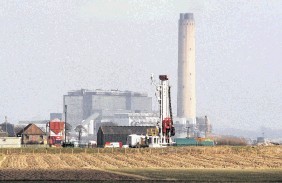
Shale is booming, but not in Europe it seems. There’s plenty of talk, not a lot of action, and what there has been has mostly so riled local populaces and NGOs that it has largely ground to a halt pending clarification, even legislation.
There is no commercial production yet, an issue that will figure at the Unconventional Gas 2012 conference in Aberdeeem on November 27-28.
Gas in Europe is expensive and UK citizens have just been treated to another round of price hikes by the greedy Big Six energy utilities just as winter is about to engulf us in its icy grasp.
While Norway does its best to plug the supplies gap, UK output goes on plummeting and there is heavy and growing dependency on Russia for supplies to Continental customers. LNG (liquefied natural gas) imports are costly and heavily influenced by the energy hungry Far East.
Meanwhile, the shale gas revolution in the US has been so successful that there are plentiful domestic gas supplies once more and commodity prices have fallen fast.
But none of this has done anything to shift public opposition to prospecting for, let alone extracting gas from shales, pretty much anywhere in the EU, including Britain.
Continental Europe is a crowded place, the UK even more so. Land and water resources were already under pressure prior to the advent of shale gas exploration. Pressure groups have successfully played on the fears of many people regarding fracking operations. The messages are that hydraulic formation fracturing causes earthquakes and pollutes water resources.
This in turn has driven the fracking, though not drilling bans imposed in Bulgaria, France and the UK pending the outcome of further studies. Plus the possibility remains that other European Union states may follow a similar route, such as Romania, for example.
The European Commission also has shale gas under study and various reservations have been expressed. The one thing it has not yet done is place obstacles in the way of more progressive players such as Poland and the UK.
Indeed, in the UK, the Government was quick to respond to public concerns that grew out of Cuadrilla’s hunt for shale gas in the Bowland Basin near the famous holiday resort of Blackpool that resulted in localised fracking-related mini-earthquakes last year. A consultation was ordered by the Government and DECC is expected to soon issue its own conclusions as to how it will assess future applications for consent to shale gas exploration drilling.
In October, UK energy Minister Edward Davey said that he hoped to allow more exploration shortly.
And Chancellor George Osborne said at the recent Tory Party Conference that he is considering a “generous new tax regime” to encourage investment in shale gas. But there is a lot of concern, even outright opposition to future shale projects in the UK, especially since there is no political priority being placed on unconventionals like shale gas as the resource is judged to be modest until proven otherwise.
Contrast this with Poland where the resource is considered huge and where there is strong political support. Exploration licensing has attracted a sizeable number of IOCs and independents, including ExxonMobil, Chevron, Eni, Talisman and Marathon – buying up drilling rights, either directly or through joint ventures (although the national oil and gas company, PGNiG, holds the most licences).
Over 100 exploration licences covering most of the prospective shale gas areas have been awarded. However, early exploration results have cast a damper on the initial hopes for a rapid take-off in production. Indeed, earlier this year, Exxon pulled stumps on its Polish shale programme following disappointing exploration results.
Since PGNiG completed Poland’s first shale well in 2009, around 20 exploration wells have been drilled. More are currently in-drill or planned. By one measure, the Polish resource may be around 5.3trillion cubic metres though this may prove over-optimistic given results to date.
Compare this with other parts of Europe, such as France where the resource may be equally considerable but where the former and unseated government led by President Sarkozy imposed a ban on fracking (though not drilling) and revoked some licences, including for Total.
Or Bulgaria, which imposed a ban on fracking at the start of this year, plus it withdrew a license issued to Chevron after hundreds of protesters marched in the city of Sofia to oppose the technique, fearing it would pollute the water and soil in the nation’s most fertile farm region of Dobrudja, which is where the company had intended to explore.
The Czech Environment Ministry has also been mulling a ban on new shale gas exploration pending changes to its licensing regime, plus a legal review.
It has emerged that Romania too is looking at imposing a shale gas moratorium, at least until after the general election on December 9.
And so it goes on. In short, deep uncertainty prevails . . . big-time.
Recommended for you
